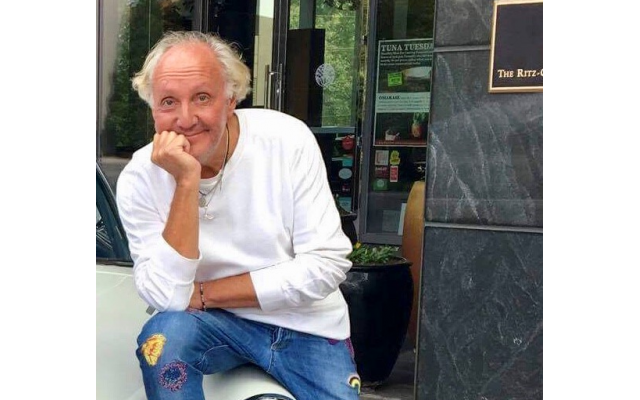Marketing Guru’s Healing Message
Joey Reiman is back with a new message that has lit up social media and serves as a platform to support friends and strangers alike who suffer from depression.
After 37 years with the Atlanta Journal-Constitution and now with the AJT, , Jaffe’s focus is lifestyle, art, dining, fashion, and community events with emphasis on Jewish movers and shakers.
He’s somewhere between Woody Allen, the Dalai Lama and Federico Fellini. He has been a purposeful and business-wise marketing stanchion on the Atlanta stage for decades. Joey Reiman is back with a new message that has lit up social media and serves as a platform to support friends and strangers alike who suffer from depression.
Globally known as the “King of Corporate Purpose,” for the past 25 years Reiman helped Fortune 500 companies discover and articulate their brands with purpose. Fast Company magazine named Reiman one of the 100 people who will change the way the world thinks. Renowned marketing professor Philip Kotler called him “The Moses of Marketing.”
These days when he’s not orchestrating a ballet for the Atlanta Symphony Orchestra, like he did in March 2018, he teaches creative and critical thinking, “Ideation,” at Emory University’s Goizueta Business School.
Last year Reiman also took the helm as founder and chairman of Brand New World Studio, a storytelling business that develops purposeful films with top tier companies such as Proctor & Gamble.
A fabulous life still did not shield him from bouts of depression, denying it, then ultimately dealing with it. “Intention heals all wounds. One can’t wait for a miracle.”
The topic seems to also concern Reiman’s students. “Ten years ago students would talk 80 percent to me about grades or schoolwork and 20 percent about personal matters. Today it’s 20 percent course-related and 80 percent anxiety/ bad feelings. … I tweaked the curriculum from corporate purpose to include ‘Why am I here?’ I see a devolvement of happy, joyous students.”
Joey’s journey unfolds.
Jaffe: What is your goal in using social media to make a safe space for others suffering from depression?
Reiman: Depressed people become anti-social. Could social media be an antidote for isolation? In today’s time, “yes.” It is like turning your hand-held device into a real hand held. I once had a girlfriend who texted me, “Is your head under your pillow? I’m here.” My head was indeed under my pillow. But with my phone, so was she and so were the words I needed to hear. That inspired me to do the same.
Jaffe: Is it cathartic to speak out about emotional problems?
Reiman: If you don’t speak out, all one can do is speak in — into yourself, into your already chaotic mind. This just exacerbates the problem. When you share your problems, they are cut in half. Hopefully, you are talking to a person who is a witness without judgment — a true blessing.
Jaffe: Do you think that high profile figures like yourself are widening the door for mental illness to be better understood?
Reiman: Jon Hamm, Ashley Judd, Gwyneth Paltrow, Jim Carrey, Harrison Ford, Angelina Jolie, Lady Gaga, Michael Phelps, J.K. Rowling, have all been visited by demons. By speaking out, they have become angels rescuing those of us stuck in the dark.
Jaffe: Is your experience that Jews have more depression and anxiety because of parental pressure, guilt or suffering, or even the well-meaning push for perfection?
Reiman: Jews tend to be perfectionists and with that comes guilt, shame, embarrassment, and the truth — no one is perfect. Western culture’s obsession with radical individualism stunts our growth as humans. Artists are more prone to depression as art is a mortal attempt to create heaven on earth. That is a daunting task, first given to the gods, then G-d, and now his disciples — artists. Being a Jewish artist is a double whammy.
Jaffe: Have you benefited from mindfulness, meditation, or other mild calming exercises?
Reiman: Yoga has been a life saver. Meditation boosts medication and sometimes your yoga mat can become your soul mat(e).
Jaffe: What books did you find most helpful? I liked “10% Percent Happier: How I Tamed the Voice in My Head, Reduced Stress Without Losing My Edge, and Found Self-Help That Actually Works” about Dan Harris’ struggles
Reiman: “Darkness Visible” by William Styron, “The Noonday Demon” by Andre Solomon, “When Things Fall Apart” by Pema Chödrön, and “Yoga for Depression” by Amy Weintraub.
Jaffe: How would you respond: Therapy versus medication in terms of healing? Genetics versus circumstance?
Reiman: Depression is not a flaw in character. It’s a mistake in chemistry. My protocol was both meds and cognitive behavioral therapy (CBT). Meds are a miracle. Unless you are wildly wealthy and can go to an oceanside sanatorium where nurses come check the condition of your easel, take meds if your doctor encourages you. In addition, see a cognitive therapist. They will help you rewire your thinking, so when your chemistry is back to normal, you don’t think yourself back into a stupor.
Jaffe: What words would you ascribe to depression?
Reiman: The word “alone” stands all alone. You can be in an arena with 50,000 people and feel ostracized. You are blinded by the darkness, and can only hear the deafening sound of silence.
Jaffe: “If you knew then what you know now” what would you have done differently, perhaps preventively?
Reiman: I would have been kinder and gentler to myself. Depression is not a weakness, rather it means you have been too strong, too long. In both cases, I learned that there is no better medicine for the brain than love in your heart.
Jaffe: What’s your mantra?
Reiman: Thoughts have wings.
Reiman’s best-selling book, “The Story of Purpose: The Path to Creating a Brighter Brand, a Greater Company, and a Lasting Legacy” follows his breakthrough business book, “Thinking for a Living.”




comments